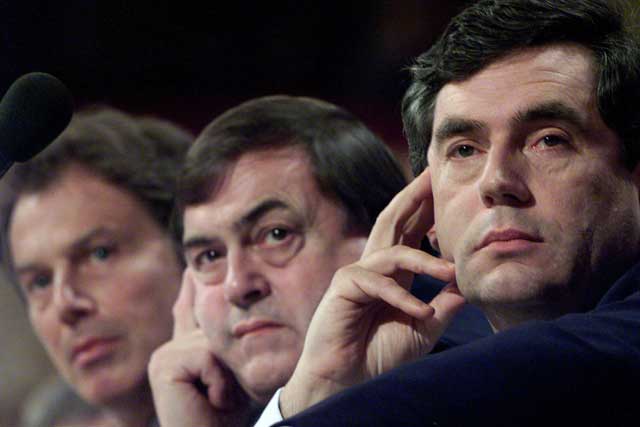The End of the Party: The Rise and Fall of New Labour, By Andrew Rawnsley

Your support helps us to tell the story
From reproductive rights to climate change to Big Tech, The Independent is on the ground when the story is developing. Whether it's investigating the financials of Elon Musk's pro-Trump PAC or producing our latest documentary, 'The A Word', which shines a light on the American women fighting for reproductive rights, we know how important it is to parse out the facts from the messaging.
At such a critical moment in US history, we need reporters on the ground. Your donation allows us to keep sending journalists to speak to both sides of the story.
The Independent is trusted by Americans across the entire political spectrum. And unlike many other quality news outlets, we choose not to lock Americans out of our reporting and analysis with paywalls. We believe quality journalism should be available to everyone, paid for by those who can afford it.
Your support makes all the difference.Political writing is not what it was. The biggest book written about Margaret Thatcher while she was in office, by the late Hugo Young, was a meticulously researched account of Thatcher's public actions, spiced by a small number of illustrative anecdotes written from the standpoint of an outsider. His contemporary counterpoint is Andrew Rawnsley, political commentator for The Observer, who writes as an insider. He is a master of the zeitgeist, a craftsman who skilfully steers readers through what they half know already, reinforcing what they already think.
His 679 page blockbuster that describes the decay of the Labour government, from 2001 onwards, opens with a lovely vignette in which Tony Blair is sprawled on the sofa in a small room next to his office, munching a BLT, receiving sage advice from the "faintly Trollopian" Cabinet Secretary, Sir Richard Wilson.
This opener is like a delicious nibble which promises that there is a satisfying main course on the way. But there is no main course. This is not a book about politics; it is the story of the adventures of Tony, Gordon and others who were in government, a flowing narrative uninterrupted by any cumbersome policy detail. This is politics reinvented as show business.
Rawnsley writes with an intimacy that analysts of the old school would avoid, because of its questionable accuracy. He repeats in quotation marks conversations held years ago, as if he had access to a verbatim record, and describes incidents as if he were in the room. Does he really know whether Blair's sandwich was a BLT, or was it, as I suspect, Rawnsley making an educated guess? There are other small details that can be checked. Rawnsley ascribes Brown's initial weakness in his jousts with David Cameron to the fact that in rehearsals, the Cameron role was played by Ed Miliband who "was not temperamentally equipped to be brutal with his boss." Actually, the Cameron role was played by Ian Austin. Rawnsley writes that on the day in October 2007 when Brown decided to call off the early general election "he asked Ed Balls to walk with him in the garden to discuss how they might limit the damage" – but on that day, Balls was in his Yorkshire constituency. In another passage, we read how Bob Shrum, Gordon Brown's American speechwriter caught a "ferocious blast" of the Prime Minster's temper. "Brown screamed at a shaking Shrum," Rawnsley wrote. But at the time of this alleged incident, Shrum had left to return to the USA.
A much bigger issue is Rawnsley's account of how Blair took the country to war in Iraq. The way he tells it, the story is a Shakespearean tragedy of a good man brought down by a fault in his strong character. In this narrative, Blair's mission from the start was to persuade the Americans not to rush into invading Iraq without UN approval. To have any influence with George Bush, he needed to pledge loyalty. As March 2003 came around, he was tied to a pledge he could not honourably break, though he knew he was taking the country into an unpopular war.
What this account misses is the hubris. Rawnsley repeatedly asserts that public opinion was opposed to going to war. But on the day after the much criticised Iraq dossier was put before the Commons in September 2002, a MORI/ITV poll showed 71 per cent were in favour of military action by the US, if this had UN support, and 49 per cent were in favour of British involvement. Blair's people were convinced that when the war was over and those weapons of mass destruction uncovered, they would enjoy what was called a "Baghdad bounce" – which indeed they did, briefly.
What Rawnsley does not share with his current readers is that he was part of the 49 per cent. He condemns Blair's presentation of the dossier to Parliament for having done "damage without parallel". But in that week, after enjoying an hour's audience with Blair, Rawnsley wrote: "The speech Mr Blair delivered to Parliament was adroit and cogent; his treatment of those who would appease or apologise for Saddam was suitably scathing." But riding the zeitgeist has always been his strength. So he was for the war then, and now writes with the air of a sage who could see a potential disaster all alone. No matter. It is all show biz.
Join our commenting forum
Join thought-provoking conversations, follow other Independent readers and see their replies
Comments